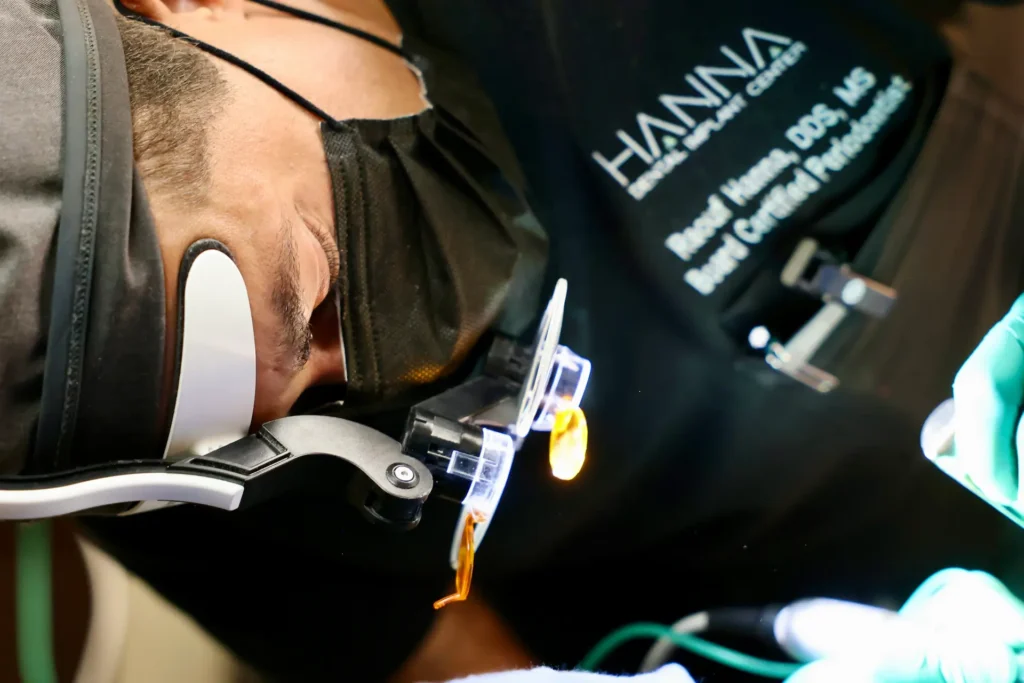Teeth issues often go unnoticed until problems like wisdom teeth arise, requiring potential surgical removal. These third molars, emerging between the ages of 17 and 25, often don’t fit in our modern mouths, leading to impaction—when there’s not enough room for them to grow properly.
This is common, with the American Academy of Oral and Maxillofacial Surgeons noting that about 90% of people have at least one impacted wisdom tooth.
Let’s explore what wisdom teeth are and how early consultation with a dental professional is crucial to understanding your options and avoiding complications.
What Are Wisdom Teeth?
Wisdom teeth are the third set of molars and often the last teeth to appear. They arrive at a time when the mouth is usually already filled with adult teeth.
As these teeth erupt, some people have enough space in their mouths to accommodate them without any issues. However, for many, the mouth is already crowded, leaving no room for these new teeth to emerge properly. This leads to what is known as impacted wisdom teeth, where the teeth are blocked from coming in normally.
Impacted wisdom teeth are divided into different types based on their direction of impaction: mesial, vertical, horizontal, or distal. Each type refers to the angle at which the tooth is trying to emerge.
Impaction can cause various symptoms, including pain, swelling, and difficulty opening the mouth, signaling that the wisdom teeth are not erupting as they should.
Common Wisdom Teeth Problems
Impacted wisdom teeth are among the most common issues people face with their third molars. When there’s not enough room for them to emerge correctly, they become trapped, leading to discomfort and other problems.
Impacted Wisdom Teeth
The term “impacted” describes a tooth that fails to break through the gum line due to lack of space. This condition can lead to several symptoms, such as pain, swelling, and sometimes an infection. The discomfort might come and go, but it often becomes more noticeable as the tooth struggles to find a pathway out.
There are four main types of impaction based on the tooth’s orientation – mesial, vertical, horizontal, or distal. Each type affects how the tooth is positioned and can influence the level of discomfort and the treatment approach.
Understanding Impacted Teeth: Causes, Symptoms, Treatment, and Care
Pericoronitis
This condition occurs when the gum tissue around the emerging wisdom tooth becomes swollen and infected. It’s common with partially erupted wisdom teeth and can cause pain, difficulty biting, or even a bad taste in the mouth due to the infection.
Dental Crowding and Misalignment
Wisdom teeth can also contribute to crowding and misalignment of your other teeth. As they push their way into a crowded mouth, they can shift other teeth, disrupting the alignment and potentially requiring orthodontic treatment to correct.
If you’re experiencing any of these symptoms or concerns, it’s important to know that you’re not alone. Many people go through similar challenges with their wisdom teeth.
Consulting with a dental professional can provide you with personalized advice and treatment options tailored to your specific situation.
Potential Complications of Wisdom Teeth Problems
Wisdom teeth problems can lead to several complications if not addressed on time.
Tooth Decay and Gum Disease
One common issue is tooth decay and gum disease. Because wisdom teeth are at the back of the mouth, they’re harder to clean. This can lead to plaque buildup, resulting in decay in the wisdom teeth and the neighboring teeth. Gum disease can also develop around the area, causing pain and swelling.
Cysts and Tumors
Cysts and tumors are another concern associated with impacted wisdom teeth. While not as common, the sac that the tooth grows from can fill with fluid, forming a cyst that can damage the jawbone, teeth, and nerves. In rare cases, tumors, which can be benign or malignant, may develop, requiring more extensive surgical procedures.
Sinus Problems
Wisdom teeth can also cause sinus problems. As they grow on the upper jaw, the roots can push against the sinuses above them. This pressure can lead to sinus pain, pressure, congestion, and headaches.
TMJ Disorders
Impacted wisdom teeth can also contribute to temporomandibular joint (TMJ) disorders. This can happen when the pressure from the growing wisdom teeth affects the bite and jaw alignment, leading to pain and dysfunction in the joint that connects the jaw to the skull.
It’s essential to monitor any changes or discomfort in your mouth and consult a dental professional if you suspect issues with your wisdom teeth.
Diagnosis of Wisdom Teeth Problems
To diagnose wisdom teeth problems, we use a combination of oral examinations and imaging techniques. During an oral exam, we will check for signs of swelling, infection, and pain. We will also ask about your symptoms to understand better what you’re experiencing.
One key tool in diagnosing wisdom teeth issues is dental X-rays or panoramic radiographs. These images allow us to see the position of your wisdom teeth, how they’re emerging, and whether they’re impacted. They can also identify hidden problems, such as decay or damage to neighboring teeth.
If your wisdom teeth are causing problems or if there’s a risk they might in the future, we will discuss the findings with you. This conversation includes the potential need for extraction and the best timing for it, considering your age, teeth development, and overall oral health.
Management and Treatment Approaches

Depending on the severity of the issue, there are several options for managing and treating wisdom teeth problems. For those not experiencing significant pain or complications, non-surgical management might be recommended. This includes pain management strategies, such as over-the-counter pain relievers and maintaining good oral hygiene with antimicrobial rinses to prevent infection.
However, surgical extraction may be necessary if wisdom teeth are impacted and cause pain, infection, or other dental issues. Before the procedure, we will discuss preoperative preparations, including the need for sedation to ensure comfort during the extraction.
Post-operative care is crucial for a smooth recovery after the extraction. This includes following a soft diet, avoiding strenuous activity, and using ice packs to reduce swelling. We will also provide guidelines on managing pain and keeping the extraction site clean to prevent infection.
In some cases, an individualized treatment plan may be developed, considering factors such as the number of wisdom teeth to be removed, the complexity of the extraction, and the patient’s overall health.
Timing and Considerations for Wisdom Teeth Removal
Deciding when to remove wisdom teeth involves several factors. It’s not just about whether these teeth are causing pain or discomfort now but also about preventing future problems. One key consideration is the person’s age. Younger individuals often recover faster from surgery, with less risk of complications. This is why dental professionals might suggest removal in the late teens or early twenties.
Another factor is the development stage of the wisdom teeth. It can be easier and less complicated to remove wisdom teeth before they are fully developed. This is because the roots are not yet fully formed, making the extraction process smoother and recovery quicker.
The potential for future issues plays a significant role in the decision to remove wisdom teeth. Even if they’re not causing problems now, wisdom teeth can lead to crowding, infections, and decay over time.
Ultimately, the decision to remove wisdom teeth should only be made after a thorough evaluation and discussion with a dental professional.
Recovery and Aftercare
After the wisdom teeth removal, follow these aftercare tips for a smooth recovery:
- Avoid strenuous activities for a few days to reduce swelling and prevent bleeding.
- Apply ice packs to your face to help with swelling and discomfort.
- Eat foods like yogurt, soup, and mashed potatoes.
- Avoid hard, crunchy, or very hot foods.
- Use prescribed or over-the-counter pain relievers as directed by your dentist.
- Brush gently and rinse your mouth with salt water or a prescribed rinse to keep the area clean.
- Avoid vigorous rinsing or spitting for the first 24 hours.
- Watch for signs of infection or excessive bleeding and contact your dentist if these occur.
Following these guidelines will help ensure a quicker and more comfortable recovery period.

Proactive Dental Care for Wisdom Teeth
To prevent wisdom teeth problems, follow these proactive care steps:
- Visit your dentist regularly to monitor the development and health of your wisdom teeth.
- Maintain good oral hygiene.
- Floss between your teeth every day to remove plaque and food particles.
- Incorporate mouthwash into your oral care routine to kill bacteria and reduce the risk of infection.
Adopting these habits can help ensure your wisdom teeth and oral health are in the best condition possible.
Taking Care of Your Wisdom Teeth is Important. Don’t Wait!
Early detection and treatment of wisdom teeth issues can prevent more serious complications. If you’re experiencing symptoms or have concerns about complex wisdom teeth removal, schedule a no-cost consultation with us today! We can provide personalized advice and treatment options tailored to your specific needs.
Frequently Asked Questions
Can wisdom teeth cause sinus problems?
Yes, wisdom teeth, especially those in the upper jaw, can cause sinus problems. As they grow, their roots can extend into the sinus area, leading to pressure and congestion in the sinuses. This can cause discomfort, sinus pain, and headaches.
Can wisdom teeth cause cavities in other teeth?
Wisdom teeth can contribute to cavities in neighboring teeth. If they don’t fully emerge or are misaligned, cleaning these areas becomes more difficult. This can lead to plaque buildup, increasing the risk of cavities in the wisdom and adjacent teeth.
What kind of problems can wisdom teeth cause?
Wisdom teeth can cause several issues, including impaction (where teeth do not fully emerge), infections, pericoronitis (inflammation of the gum tissue around the tooth), crowding or damaging neighboring teeth, and cysts or tumors.
What happens if you don’t remove wisdom teeth?
If not removed, problematic wisdom teeth can lead to long-term issues, such as chronic pain, infection, damage to adjacent teeth, and potential complications with cysts and tumors. However, not all wisdom teeth need to be removed if they are healthy, fully emerged, and not causing problems.
What happens if you leave wisdom teeth in too long?
Leaving wisdom teeth in for too long, especially if they are impacted or causing problems, can lead to more severe complications. These include significant damage to other teeth, infections, cysts, and increased difficulty in removal, which might lead to a more complicated recovery.
How do you know if your wisdom teeth are broken?
Signs of a broken wisdom tooth include sharp pain in the area, difficulty chewing, sensitivity to hot and cold, swelling around the jaw, and sometimes visible pieces of the tooth in the mouth. If you suspect a broken wisdom tooth, seeing a dentist as soon as possible is important to assess the situation and prevent further damage or infection.



